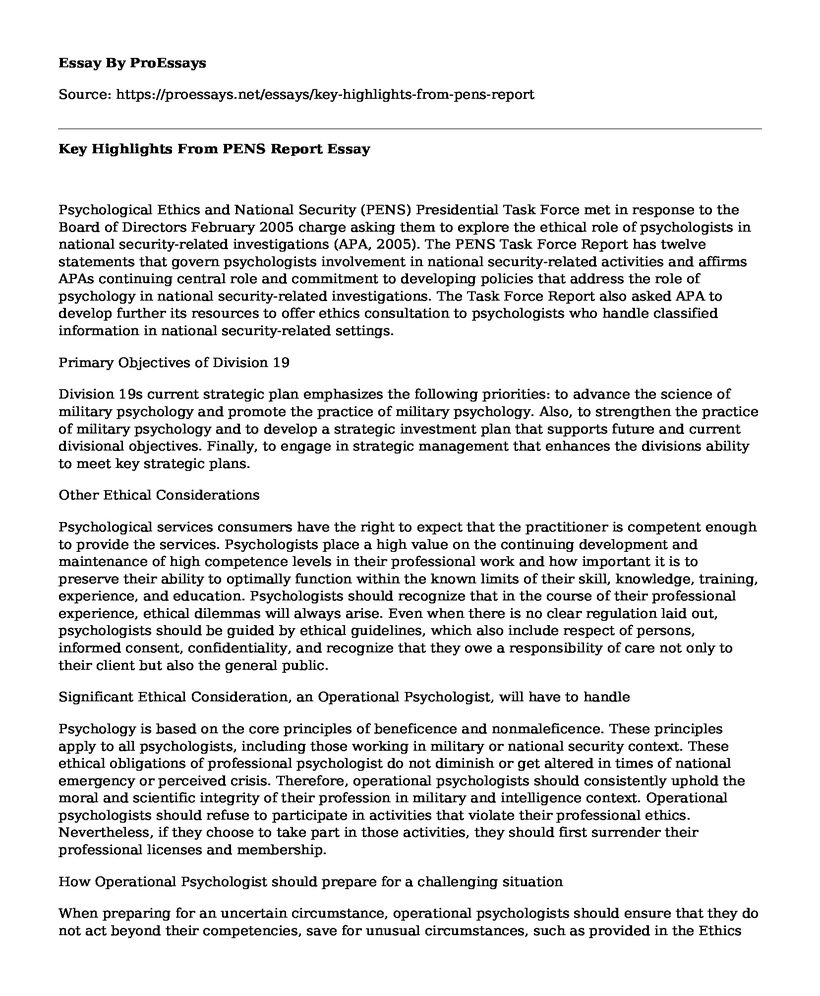Psychological Ethics and National Security (PENS) Presidential Task Force met in response to the Board of Directors February 2005 charge asking them to explore the ethical role of psychologists in national security-related investigations (APA, 2005). The PENS Task Force Report has twelve statements that govern psychologists involvement in national security-related activities and affirms APAs continuing central role and commitment to developing policies that address the role of psychology in national security-related investigations. The Task Force Report also asked APA to develop further its resources to offer ethics consultation to psychologists who handle classified information in national security-related settings.
Primary Objectives of Division 19
Division 19s current strategic plan emphasizes the following priorities: to advance the science of military psychology and promote the practice of military psychology. Also, to strengthen the practice of military psychology and to develop a strategic investment plan that supports future and current divisional objectives. Finally, to engage in strategic management that enhances the divisions ability to meet key strategic plans.
Other Ethical Considerations
Psychological services consumers have the right to expect that the practitioner is competent enough to provide the services. Psychologists place a high value on the continuing development and maintenance of high competence levels in their professional work and how important it is to preserve their ability to optimally function within the known limits of their skill, knowledge, training, experience, and education. Psychologists should recognize that in the course of their professional experience, ethical dilemmas will always arise. Even when there is no clear regulation laid out, psychologists should be guided by ethical guidelines, which also include respect of persons, informed consent, confidentiality, and recognize that they owe a responsibility of care not only to their client but also the general public.
Significant Ethical Consideration, an Operational Psychologist, will have to handle
Psychology is based on the core principles of beneficence and nonmaleficence. These principles apply to all psychologists, including those working in military or national security context. These ethical obligations of professional psychologist do not diminish or get altered in times of national emergency or perceived crisis. Therefore, operational psychologists should consistently uphold the moral and scientific integrity of their profession in military and intelligence context. Operational psychologists should refuse to participate in activities that violate their professional ethics. Nevertheless, if they choose to take part in those activities, they should first surrender their professional licenses and membership.
How Operational Psychologist should prepare for a challenging situation
When preparing for an uncertain circumstance, operational psychologists should ensure that they do not act beyond their competencies, save for unusual circumstances, such as provided in the Ethics Code (Ethical Standard 2.02, Providing services in emergencies) (Ethics of Operational Psychology Workshop, 2015). Operational Psychologists must see to it that they are relying on methods that are safe, legal, safe, and effective. They should also refrain from creating multiple relationships with their clients if it will ultimately affect their objectivity, effectiveness, and competence.
Where can Operational psychologists seek guidance
Operational psychologists should consult when they are facing difficult ethical dilemmas. The Taskforce was emphatic that consultation on ethics questions and dilemmas are highly appropriate for all psychologists regardless of their level of experience. When dealing with uncertain issues, operational psychologists can consult with other colleagues, APA Ethical Standards, and APA Ethics Code. Always consider peer advance, legal guidance and advice from Health Professions Council, and other relevant body but should be guided by the Code of Ethics and Conduct.
References
American Psychological Association. (2005). Report of The Presidential Task Force On Psychological Ethics and National Security. Retrieved from http://www.apa.org/pubs/info/reports/pens.pdf
Ethics of Operational Psychology Workshop. (2015). The Brookline Principles on the Ethics of Operational Psychology. Retrieved from http://aut.ac.nz.libguides.com/APA6th/reports
Cite this page
Key Highlights From PENS Report. (2021, Mar 24). Retrieved from https://proessays.net/essays/key-highlights-from-pens-report
If you are the original author of this essay and no longer wish to have it published on the ProEssays website, please click below to request its removal:
- The Therapeutic Use of Narrative Therapy With Oncology Patients Paper Example
- Impact of Nurse-Patient Ratio on Healthcare Costs Essay Example
- Research Paper on Pharmaceutical Chemistry
- Professional Socialization in the Mental Health Nursing Profession Paper Example
- Paper Example on Community Health Assessment: Finding Loopholes for Health Improvement
- Research Paper on ADHD: Definition, Causes, Symptoms, & Treatment
- Paper Example on My Family Values vs. Cultural/Ethnic Values







